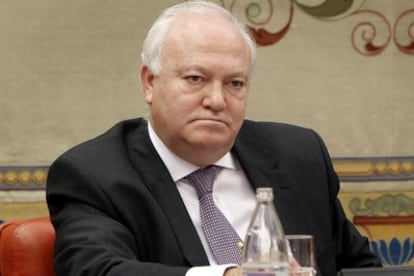Spain favored Morocco's autonomy plan for Western Sahara
Government under fire after embassy cables show extent of consultations with Rabat
Ever since the Socialists came to power in 2004, they made a point of maintaining a public stance with regard to the Western Sahara conflict that appeared to be equidistant. Yet behind the scenes, the government supported and even offered to advise Rabat on how best to craft its plan for Sahrawi autonomy under Moroccan sovereignty.
Dozens of leaked cables from the US embassies in Madrid, Rabat and Paris showcase the apparent ambiguity of the Spanish position - some describe it as "confused" - but ultimately, Spain aligns, with some caveats, with the Moroccan viewpoint. Bucharaya Beyun, the representative in Spain for the pro-independence Polisario Front, said the WikiLeaks documents proved the Zapatero administration has always supported Morocco's thesis favoring "the autonomy and occupation of Western Sahara."
Polisario: "WikiLeaks texts prove Spain support for autonomy and occupation of Western Sahara"
The congressional spokesman for the United Left, Gaspar Llamazares, said that the classified cables showed the Spanish government did not keep a neutral position but a very "partial" one that favored Morocco's idea of limited Sahrawi autonomy under its own rule.
"Spanish Socialists have not been honest with the Sahrawis," said Algerian President Abdelaziz Bouteflika in August 2005, illustrating his country's unease over the foreign policy of the Socialist government in Madrid. Bouteflika also complained to US Senator Richard Lugar, whom he received in Algiers, that Spain was proposing that Algeria negotiate with France and Morocco to resolve the Western Sahara conflict. Algeria (which is home to a significant community of Sahrawi refugees and the Polisario leadership) would not negotiate in their name, he said.
Then-Foreign Minister Miguel Ángel Moratinos denied attempting to get that four-sided negotiation underway, even though he mentioned the idea regularly. In 2008, when he met in Madrid with David Welch, assistant to the state secretary in charge of Middle East affairs, Moratinos tried to get the US to join the negotiations that ultimately never took place.
After rejecting the Baker Plan for the former Spanish colony, now considered a non-self-governing territory by the United Nations, Rabat reached the conclusion that saying "no" was not enough and that it needed to produce an alternative proposal. From the beginning, Spain supported this idea. "Morocco must present a credible autonomy plan," said the Spanish Ambassador in Rabat, Luis Planas, to his US counterpart Thomas Riley in 2006. Planas warned that before making a decision on the plan, Spain would have to examine it first, but that in the meantime it would provide "comfort and support."
That same year, Moratinos drew up a non-paper, or an unofficial document presenting government policy, with ideas about the territory. This was distributed among the permanent members of the UN Security Council, and proposed abandoning "decolonization" vocabulary such as sovereignty and independence in favor of "globalization" terms such as regionalization, autonomy, and self-rule. The cable also notes that the non-paper "is also clearly colored by and suggests a solution similar to the approach which Spain has taken with its own region of Catalonia."
The Western Sahara impasse continues to be an unresolved problem today.

Tu suscripción se está usando en otro dispositivo
¿Quieres añadir otro usuario a tu suscripción?
Si continúas leyendo en este dispositivo, no se podrá leer en el otro.
FlechaTu suscripción se está usando en otro dispositivo y solo puedes acceder a EL PAÍS desde un dispositivo a la vez.
Si quieres compartir tu cuenta, cambia tu suscripción a la modalidad Premium, así podrás añadir otro usuario. Cada uno accederá con su propia cuenta de email, lo que os permitirá personalizar vuestra experiencia en EL PAÍS.
¿Tienes una suscripción de empresa? Accede aquí para contratar más cuentas.
En el caso de no saber quién está usando tu cuenta, te recomendamos cambiar tu contraseña aquí.
Si decides continuar compartiendo tu cuenta, este mensaje se mostrará en tu dispositivo y en el de la otra persona que está usando tu cuenta de forma indefinida, afectando a tu experiencia de lectura. Puedes consultar aquí los términos y condiciones de la suscripción digital.








































